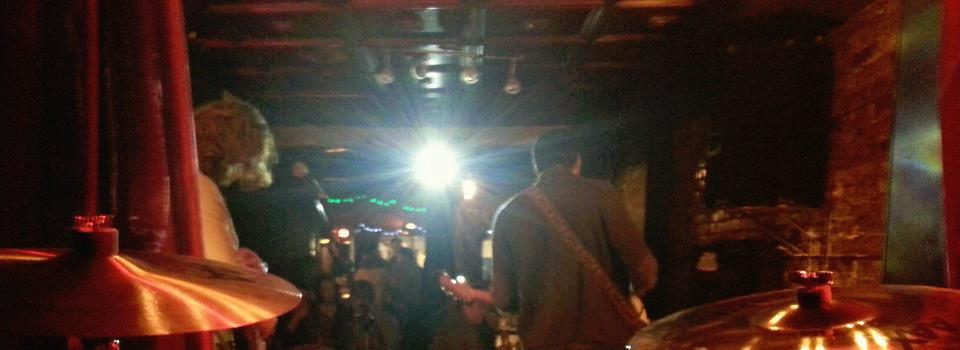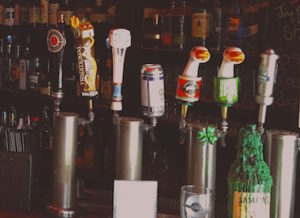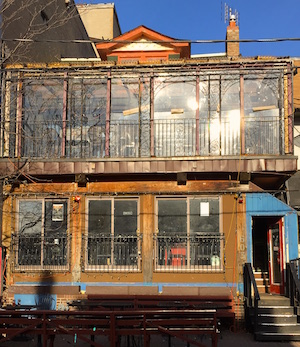Build Your Skills
Learn music theory Train your ears Track your tempoRead Now
Get the Newsletter
Categories
- | BeatMirror (10)
- | HearEQ (11)
- | Waay (22)
- | WaayFinder (1)
- Audio (16)
- For musicians (34)
- Guitar (2)
- Music theory (15)
- News (42)
- Startup stories (2)
- Tutorial (4)
Keep in Touch
About Ten Kettles
We love music, we love learning, and we love building brand new things. We are Ten Kettles.
Read more >-
May 30, 2016
Interview with Lucan Wai of The Central & Smiling Buddha (Part 2)
For most active musicians, booking and playing great gigs is a top priority. But landing those gigs isn’t always easy. Depending on your style of music and the cities you’re playing, seeking out good performance opportunities can be an intimidating experience. So we went to the experts!
Lucan Wai is the owner of two popular Toronto venues—The Central and Smiling Buddha—and he books 1000+ musical acts a year in a very wide variety of styles. That’s right, over a thousand. We recently sat down for a chat at The Central to talk about shows—you’ll definitely want to hear what he has to say.
In Part 1 of the interview we talked about approaching a venue, getting an audience, and paying bands. In this article, we discuss setting your cover charge, finding other bands to join your shows, how to get that second show, and more. Finally, we finish things off with some rapid-fire questions for Lucan. You’ll want to check this out! (Edits have been made for length, clarity.)
Bands and cover charge
Alex (Ten Kettles): Do you have any advice for bands who are putting on shows and want to find some other musical acts to join the gig?
Lucan: Before asking [a venue] for a date, I’d have an idea who you’re bringing with you. Especially if you’re a promoter and don’t have a headliner yet. Have an idea of what bands you’d invite, the bands you’d ask. Even if you’re headlining a show, there’s still three other hours of music. I like to know what I’m booking. I know it’s impossible to confirm bands without having a firm date, but have an idea who you’ve performed with in the past, what went well with your music. And send links to that as well.
Alex: OK, so approach you only when you have all your bands together, or at least a good idea.
Lucan: Have an idea who you would ask. One of my first questions is always gonna be “Who did you invite to open with you?” When I speak to you, I want to know “are you filling up the rest of the bill.” To get an idea who’s on that bill, the kind of music you’re putting on that night. Have an idea what your charge is. Some bands will try and charge $15 here [The Central], and for a smaller venue $15 is a bit high. I would say if you have a really good reason, like if you feel like you brought a really committed crowd. Or if you’re doing a fundraiser, people open up a bit more. The Central’s door charge tends to be a bit lower, the Buddha is a bit higher.
Alex: So pick a cover charge proportional to the venue size?
Lucan: A little bit. Kind of know what you’re getting. The Buddha’s more of a “proper venue” so you can have a firm cover charge, people pre-sell tickets. There’s a lot of people who come by, they might just be popping in for a beer, but if you have an easy $5 cover, that’s not hard for people to toss in just to come check it out. But if you’re charging $10/15, some guy just walking by heard the music, he might be with 4 or 5 buddies, they might not all want to toss in $10 to come in.
Alex: So it can discourage walk-ins…
Lucan: Again, it depends on your crowd and what night. If you think you’re gonna have a busy night, I wouldn’t have a problem with [a high cover charge]. But if you’re just getting started and you’ve got a slower night, I would take that into consideration.
Audience and promotion
Alex: One challenge I’ve noticed at shows is getting the fans of each band to stick around for the other bands. Because if you have 60 people coming to a show, but there’s only ever 20 at a time in the venue, you never really take advantage of that great feel you get playing to the full crowd. What advice would you give to somebody booking a show and trying to pick other bands where the audience is going to stick around the whole night?
Lucan: A lot of it depends on the artist. A lot of people invite their fans to stick around and have a beer with them after, and we’ve got a second floor for an after-party upstairs. You guys were always fun, you’d stick around for drinks afterwards and go upstairs and hangout and I think people appreciate that as well. So, I guess let people know you’re sticking around, enjoy the rest of the night, it’s gonna be a fun night. Let people know on your Facebook event page, or even if you’re texting people, let them know you’ll be sticking around all night—even if they’re coming late, don’t feel like they shouldn’t come out.

Photo snapped by drummer Jason Lam from The Kettles at The Central.
Alex: So, sell it as an event and a party in addition to being a concert
Lucan: Especially when you’re starting out, a lot of people coming are mostly just like your buddies helping to support you. They’re more likely to do that. Whereas, a guy who’s just there for your music they might just be there for that.
“Encourage people to come and support the whole night”
Another thing, when people ask about set times, just encourage people to come and support the whole night. It’ll be a good bill. For a promoter, you’ll want to offer set times, but for a lot of these smaller bands where it’s more just kind of a night, especially here [The Central] where we’re a little less formal with set times. Whereas at the Buddha we’ll have sound check, we’ll ask for set times and stick to the night. But here, it’s more informal, if you’re running more behind or ahead, or want to switch with bands running late we don’t really have a problem with that.
Alex: Are there any tips you’d give new bands on how to get people to show up?
Lucan: I think the more promotion the better. The quickest and easiest thing to do is setup an event page on Facebook and ask everyone to send out invites. I live on my phone, I’m on Facebook every day. The easiest way to get a hold of me is on Facebook, send me an invite, send your reminders and stuff. I think posters are great, but realistically though you have to print a lot of posters and put up a lot of posters to reach people who aren’t necessarily on Facebook.
Your second gig
Alex: So, a band comes in to play their first show. What turns a first show into a second show? What things make you say “I want to have this band back”?
Lucan: The only reason I would not invite a band back is if they like ruined or destroyed gear—or they were totally unprofessional, they offended my staff. Sometimes we have someone say something that offends my staff. Or if they said something sexist, misogynistic, racist, or homophobic on stage. But if you don’t misrepresent yourself… like if some of the members are 18 but you said you were all 19 [Ontario’s drinking age], then that’s something we’d take into consideration for next time.
“The only reason I would not invite a band back is if they like ruined or destroyed gear—or they were totally unprofessional
But if you didn’t bring anyone, I might not give you a Friday night but I’d maybe try and get you a weekday. Or find you a smaller venue. Or if I thought the Buddha was a bit too large for you, we’d try The Central. The Buddha’s also got a basement for smaller shows. We do smaller acoustic stuff upstairs here [The Central] as well.
 Ever struggled with bad sound at a show? Train your ears to get better sound with hearEQ
Ever struggled with bad sound at a show? Train your ears to get better sound with hearEQAlex: Does that happen often?
Lucan: No, not often. Pretty much I can remember everyone off the top of my head [laughs]. Doesn’t happen often. It’s rare.
Alex: So, in general, advice for bands would be—
Lucan: Behave yourselves. But yeah, if you don’t bring people I’m not going to blacklist you for that.
Alex: Just maybe not give you the hottest night…
Lucan: Or maybe I’d have a chat with you: “You know what, how’d promotion go, maybe we can change things maybe do something differently.” And it’s not just one band, you do bring 3 or 4 bands per bill. So there’s so many factors, right. Everyone can hustle, everyone can do their jobs, some days there’s just so much else happening. Weather’s a big factor. Some days you just never know.
“Everyone can hustle, everyone can do their jobs, some days there’s just so much else happening”
Rapid fire!
Alex: What’s the #1 thing a band should do when approaching a venue to book their first show?
Lucan: I would say link to your material. I want to hear what you sound like first of all.
Alex: What’s the #1 thing a band can do to get invited back for a second show?
Lucan: Be professional. Show up early, or at least show up on time. Do what you can to promote. If you bring out a great draw, that’s amazing. But I wouldn’t not invite you back if not a lot of people showed up.
Alex: For a concert, someone who’s organizing something for the first time, what’s your go-to number of bands and lengths of sets?
Lucan: I’d say 45 minutes sets and 3–4 bands, it depends on the night. I think 3 or 4 bands is good.
Alex: If you could offer one general piece of advice to bands really on anything, what would it be?
Lucan: Just keep at it, just hustle and keep at it. That’s it!
Alex: Where can people find out more about The Central, Smiling Buddha, and Lucan Wai?
Lucan: Here are some links to our websites, we’ve got online submission forms there: Smiling Buddha, The Central. You just fill out the forms, pretty simple. Name, contact number, links to your material, good description of what you’re up to! You can also find us on Facebook (Smiling Buddha, The Central), Instagram (Smiling Buddha, The Central), and Twitter (Smiling Buddha, The Central).
That’s a wrap
 That’s it! A big thanks to Lucan Wai for sharing all this great advice for bands and musicians. If you haven’t already, check out Part 1 of the article and sign up for our newsletter to find out about new articles for musicians as they’re released.
That’s it! A big thanks to Lucan Wai for sharing all this great advice for bands and musicians. If you haven’t already, check out Part 1 of the article and sign up for our newsletter to find out about new articles for musicians as they’re released.Oh, and one more thing: in Canada, a cover charge of $6 or more makes you eligible for SOCAN payments as long as you’re playing original music. (Around $50 a show in my experience, but can vary.) Read up here. This is a great way to boost income from your concerts, and $6 is a pretty reasonable cover charge for new bands too!
Happy playing.
Full disclosure: I’ve had the fortune of playing both these venues a number of times over the years.



Comments